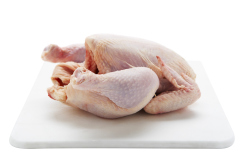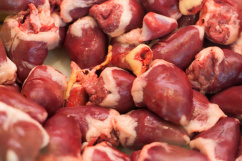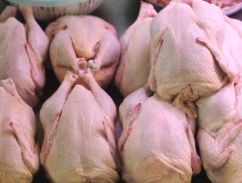Chicken
The FSA’s year-long survey, which tested around 4,000 samples of whole chickens bought from UK retail outlets and smaller independent stores and butchers over the past 12 months, found the presence of campylobacter in 73% of chickens tested. One-fifth (19%) of chickens tested positive for campylobacter with the highest band of contamination (more than 1,000 colony forming units per gram (>1,000 cfu/g)).
Just 0.1% (five samples) of packaging tested positive at the highest band of contamination with 7% of packaging testing positive for the presence of campylobacter.
All of the major retailers failed to reach industry targets to reduce the bug over the period of the study. Tesco was found to have the lowest numbers of campylobacter, with just 12.8% of its chickens found to have the highest band of contamination while 66.5% of its chickens had presence of campylobacter.

Marks & Spencer, Morrisons, Sainsbury’s and Tesco all had below-average levels of campylobacter found, while 80% of Asda chickens tested positive for its presence. Just under one-third (29.7%) of Asda chickens tested positive for the highest band of contamination.
Steve Wearne, FSA director of policy, praised the retailers that had reduced incidents of campylobacter but called for more action: “I am absolutely delighted to see the really encouraging results from these four supermarkets and their suppliers. They are making a real difference to public health, helping to cut down on the estimated 280,000 people who get ill from campylobacter each year.
“As we have always said, if you are prepared to work across the food chain to reduce the spread of this bug then you will get results.
“I want to challenge those retailers who haven’t yet demonstrated the effect that M&S, Morrisons, The Co-op and Waitrose are having on reducing campylobacter on chickens on their shelves. We expect all retailers and processors to be achieving the reductions we have seen in these retailers’ figures – that’s the only way we will meet the target we all signed up to.
“We are going to run this survey for a second year and will again look at campylobacter levels on chickens at retail sale. I hope that we will be able to see the results from the actions taken by the four retailers mentioned above and others come through and produce much lower figures for the incidence of campylobacter on the chicken we buy.”
Richard MacDonald, chair of the ACT (Acting on Campylobacter Together) board, added: “I have been impressed by the level of commitment and tangible action being taken by a number of retailers and processors of chicken. I hope we continue to see further progress in our fight to significantly reduce or even eradicate campylobacter on chickens. Individual actions and cross-industry sharing of best practice are starting to have a real and tangible impact.”
Commenting on the results, a British Poultry Council spokesperson said: “As highlighted by the FSA, individual producers and their retail customers are working bilaterally to trial options including enhanced biosecurity, management of thinning, improved processing, temperature treatments, and novel packaging. It is worth reiterating that campylobacter is killed by thorough cooking, and cross-contamination can easily be avoided by good kitchen hygiene practices.
“The BPC is committed to ensuring that when practical and effective solutions for beating campylobacter are developed, they will be made available to all producers.”
A new survey will start this summer and once again sample fresh whole chickens from all types of shops
Offal distributor Elmgrove Foods has made the Sunday Times Virgin Fast Track 100 list, made up of country’s fastest-growing companies.
Elmgrove Foods of Co Tyrone, Northern Ireland, produces more than 100 beef, lamb, pork and chicken offal products, which are all distributed internationally. The company made it to 62 on the Sunday Times list.

To make it into the top 100, companies must have an operating profit of over £500,000 and annual sales must exceed £250,000. The distributor makes 100% of its profits from exports.
Stuart Dobson, managing director, said he was “thrilled” to have made the Fast Track 100 list, adding that the market for fifth-quarter products continues to grow.
“The export business for offal is becoming more and more competitive, with increased numbers of UK export start-ups and international customers coming direct to source products. Forging and maintaining long-lasting relationships between suppliers, customers and our strong team have been our recipe for the company’s success. Elmgrove’s key is creating new products regularly, our portfolio has over 100 products, which are of high quality and exceed customer expectations,” Dobson told Meatinfo.co.uk.
Elmgrove Foods also won last year’s Food and Drink Federation Exporter of the Year award, as well as the Queen’s Award for Enterprise 2013.
Richard Branson, owner of Virgin, which has sponsored the fast-track list since it began in 1996, said: “This year’s Fast Track 100 is packed full of examples of entrepreneurs taking on many different challenges head-on. Their success is based on real team spirit and it is this togetherness, above and beyond any other factor, that sets great businesses apart from also-rans. The Fast Track 100 is testament to that spirit of creativity and camaraderie.”
A former government advisor and leading food expert has called for a boycott on supermarket chicken following yesterday’s campylobacter results.
Writing on The Guardian website, Professor Tim Lang called for the British public to boycott supermarket chicken products: “Dear British public, be outraged, act, withhold your money until you can have confidence in what you consume. This may not be orthodox public health strategy but it is definitely what history shows works when standards are as dire as these results show them to be,” he stated.

Lang was a former expert advisor to the health and environment department until 2011 and was instrumental in the set up of the Food Standards Agency (FSA). His comments follow yesterday’s revelation by the FSA that 70% of supermarket chickens tested positive for the bug.
Lang said the FSA results were as bad as the salmonella scandal and BSE in cattle: “What these results show is that they have slipped backwards again: the rate of campylobacter is even higher than the rate of salmonella in poultry was in the 1980s; this is dreadful. Salmonella has come down and our problem now is campylobacter; but one form of bad news fading only to be replaced by new bad news is hardly progress,” Lang stated.
However, the British Poultry Council refutted Lang’s comments in a statement: “There is absolutely no reason for anyone to stop buying British poultry. All poultry is safe to eat. Millions of consumers enjoy poultry every day as they recognize it is a safe, affordable and environmentally sustainable quality meat.
“Consumers are able to make an informed choice, and they have consistently made poultry their favourite meat – in the UK almost as much poultry is consumed as beef, pork and lamb combined.
“The industry is working hard to tackle the bacterium before it reaches consumers, but consumers also have an important role to play as proper cooking kills campylobacter.”
Asda came out worse of all the retailers with 78% of its raw chicken products testing positive for campylobacter. Asda said it was disappointed at the results and stressed it was “working hard” to find a solution.